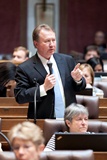
State Budget Update
April 17, 2015
|
Contact Me |

State Capitol
P.O. Box 8953
Madison, WI 53708
PH: (608) 266-0631
TF: (888) 534-0094
FAX: (608) 282-3694
District/Law Office
1230 Ferry Street
La Crosse, WI 54601
(608) 785-1886
rep.doyle@legis.wi.gov
On the Web:
http://doyle.assembly.wi.gov
|
In The District |
In The
Legislature
***
Assembly Committee on Financial Institutions - Ranking Member
Assembly Committee on Insurance
- Ranking Member
Assembly Committee on
Small Business Development
Joint Review Committee on
Criminal Penalties

The Joint Finance Committee
was back in executive session today. For those of you who need a
refresher on state budget lingo, an executive session is where a
committee meets to vote on proposals before them. For the JFC, these
sometimes last all day and are spread out over a number of weeks in
order to cover all the topics in this year’s budget proposal. Just to
give you an idea, the budget is 1839 pages and takes up two thick
binders on my desk. The summary of the budget is 559 pages and another
thick binder. Obviously, this process takes some time.
Just like on Wednesday, the JFC continued their work going through the
budget line by line, amending, deleting and approving each provision.
Here are some of the results of their work:
Technical Colleges

-
Currently, 20% of funding for technical colleges is based on school performance. The Governor’s budget increased the percentage annually and by 2019, 100% of that funding would be based on performance.
-
The JFC voted to set the percentage at 30%
Veterans

-
The Governor’s budget wanted to give $500,000 in grants to the Global Enterprise Collective, a group that helps veterans’ startup companies. (Previously known as Vetransfer).
-
The JFC voted unanimously to give that money to technical colleges for programs designed to help veterans get jobs. The colleges will find matching grants from other organizations.
FoodShare

-
Two years ago, the Governor passed a law requiring able-bodied people who don’t have dependents to get job training in order to receive FoodShare benefits. The Governor’s budget proposal would add money to that program to fully fund it.
-
The JFC voted to go along with that plan
-
The JFC also voted to charge food-stamp recipients $3.50 when they lose their card
Property Insurance

-
The Governor’s budget eliminates a program to provide property insurance to local governments. The coverage would be scheduled to end at the end of 2016
-
The JFC voted to agree with the Governor’s plan but scheduled the termination for the end of 2018. Local governments will have to look to the private sector for insurance.
Military Equipment by Police

-
The JFC voted unanimously to limit the ability of local governments to use military vehicles and equipment in their policing activities
One big issue that the JFC was expected to take up was the proposed
elimination of the state board that regulates private, for-profit
colleges. This is known as the Educational Approval Board (EAB) and
under the Governor’s proposal its duties would be transferred to
other state agencies. There is no word yet on why this was taken off
the agenda.
Another part of the budget process is the idea of a motion. A motion
is like an amendment that a member of the Joint Finance Committee
introduces to add, modify or replace another section of the budget.
Every time JFC meets, the members propose and debate many motions,
some of them mundane and others representing a serious departure
from the Governor’s plan. Today the JFC voted on a budget motion
that was based on one of my bills.
This motion, nicknamed “Workforce Growth 2.0,” would create a
competitive grant training program for Wisconsin businesses, provide
a dual enrollment pilot program between our K-12 schools and our
technical colleges focusing on innovation, and create Veteran
Success Grants to help veterans explore their career options. In
essence, it works to connect the successful training programs at our
technical colleges to students, workers and businesses.
Unfortunately this motion was not adopted by the JFC. Despite this,
I will keep working to see this idea signed into law in the form of
a bill.
The JFC is slated to meet next on Wednesday April 22nd. Their agenda
includes the DNR, Dept. of Tourism, and funding for the Dept. of
Transportation.
Sincerely,
STEVE DOYLE
State Representative
94th Assembly District
If you would like to have your name removed from this email list, please reply to this message with “Unsubscribe” in the subject line